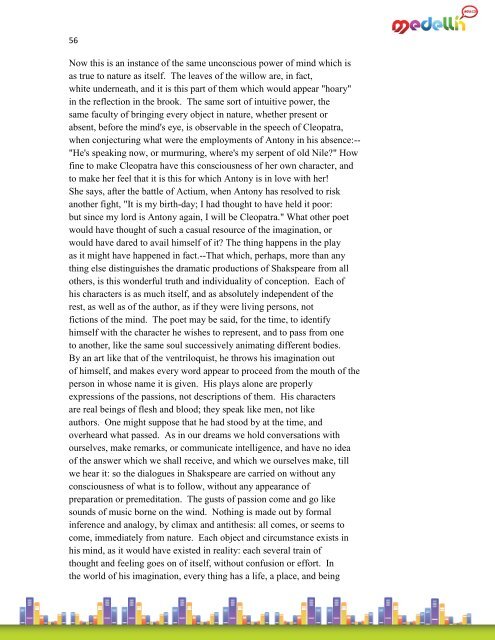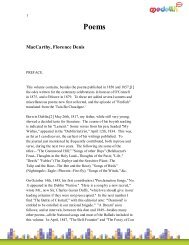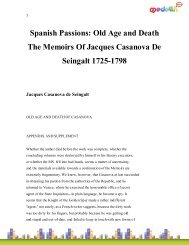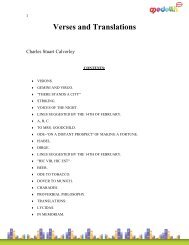Lectures On The English Poets William Hazlitt
Lectures On The English Poets William Hazlitt
Lectures On The English Poets William Hazlitt
You also want an ePaper? Increase the reach of your titles
YUMPU automatically turns print PDFs into web optimized ePapers that Google loves.
56<br />
Now this is an instance of the same unconscious power of mind which is<br />
as true to nature as itself. <strong>The</strong> leaves of the willow are, in fact,<br />
white underneath, and it is this part of them which would appear "hoary"<br />
in the reflection in the brook. <strong>The</strong> same sort of intuitive power, the<br />
same faculty of bringing every object in nature, whether present or<br />
absent, before the mind's eye, is observable in the speech of Cleopatra,<br />
when conjecturing what were the employments of Antony in his absence:--<br />
"He's speaking now, or murmuring, where's my serpent of old Nile?" How<br />
fine to make Cleopatra have this consciousness of her own character, and<br />
to make her feel that it is this for which Antony is in love with her!<br />
She says, after the battle of Actium, when Antony has resolved to risk<br />
another fight, "It is my birth-day; I had thought to have held it poor:<br />
but since my lord is Antony again, I will be Cleopatra." What other poet<br />
would have thought of such a casual resource of the imagination, or<br />
would have dared to avail himself of it? <strong>The</strong> thing happens in the play<br />
as it might have happened in fact.--That which, perhaps, more than any<br />
thing else distinguishes the dramatic productions of Shakspeare from all<br />
others, is this wonderful truth and individuality of conception. Each of<br />
his characters is as much itself, and as absolutely independent of the<br />
rest, as well as of the author, as if they were living persons, not<br />
fictions of the mind. <strong>The</strong> poet may be said, for the time, to identify<br />
himself with the character he wishes to represent, and to pass from one<br />
to another, like the same soul successively animating different bodies.<br />
By an art like that of the ventriloquist, he throws his imagination out<br />
of himself, and makes every word appear to proceed from the mouth of the<br />
person in whose name it is given. His plays alone are properly<br />
expressions of the passions, not descriptions of them. His characters<br />
are real beings of flesh and blood; they speak like men, not like<br />
authors. <strong>On</strong>e might suppose that he had stood by at the time, and<br />
overheard what passed. As in our dreams we hold conversations with<br />
ourselves, make remarks, or communicate intelligence, and have no idea<br />
of the answer which we shall receive, and which we ourselves make, till<br />
we hear it: so the dialogues in Shakspeare are carried on without any<br />
consciousness of what is to follow, without any appearance of<br />
preparation or premeditation. <strong>The</strong> gusts of passion come and go like<br />
sounds of music borne on the wind. Nothing is made out by formal<br />
inference and analogy, by climax and antithesis: all comes, or seems to<br />
come, immediately from nature. Each object and circumstance exists in<br />
his mind, as it would have existed in reality: each several train of<br />
thought and feeling goes on of itself, without confusion or effort. In<br />
the world of his imagination, every thing has a life, a place, and being

















